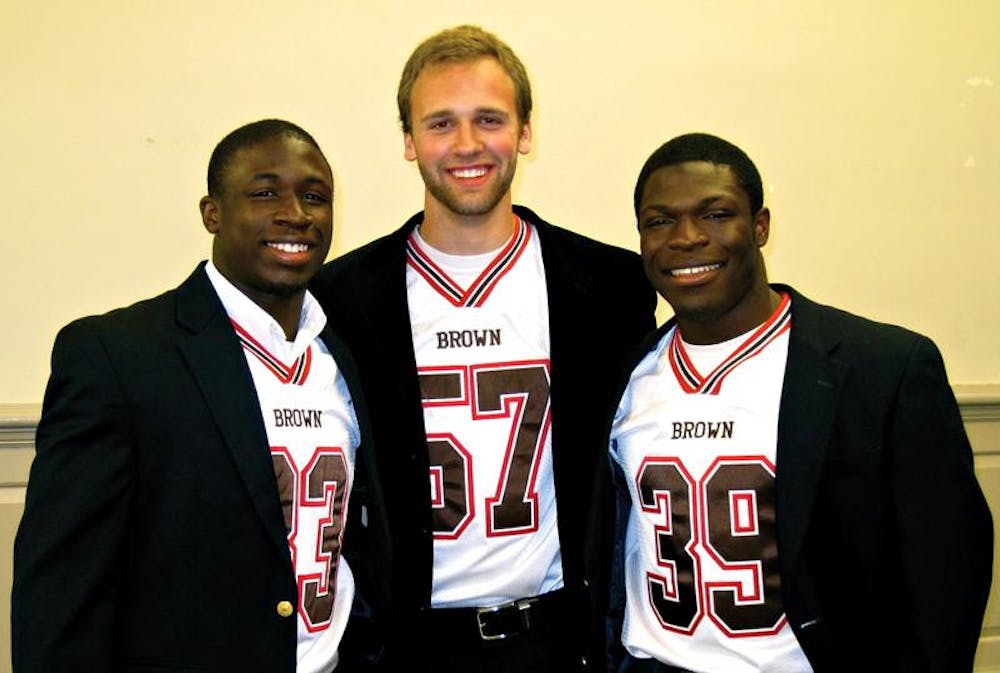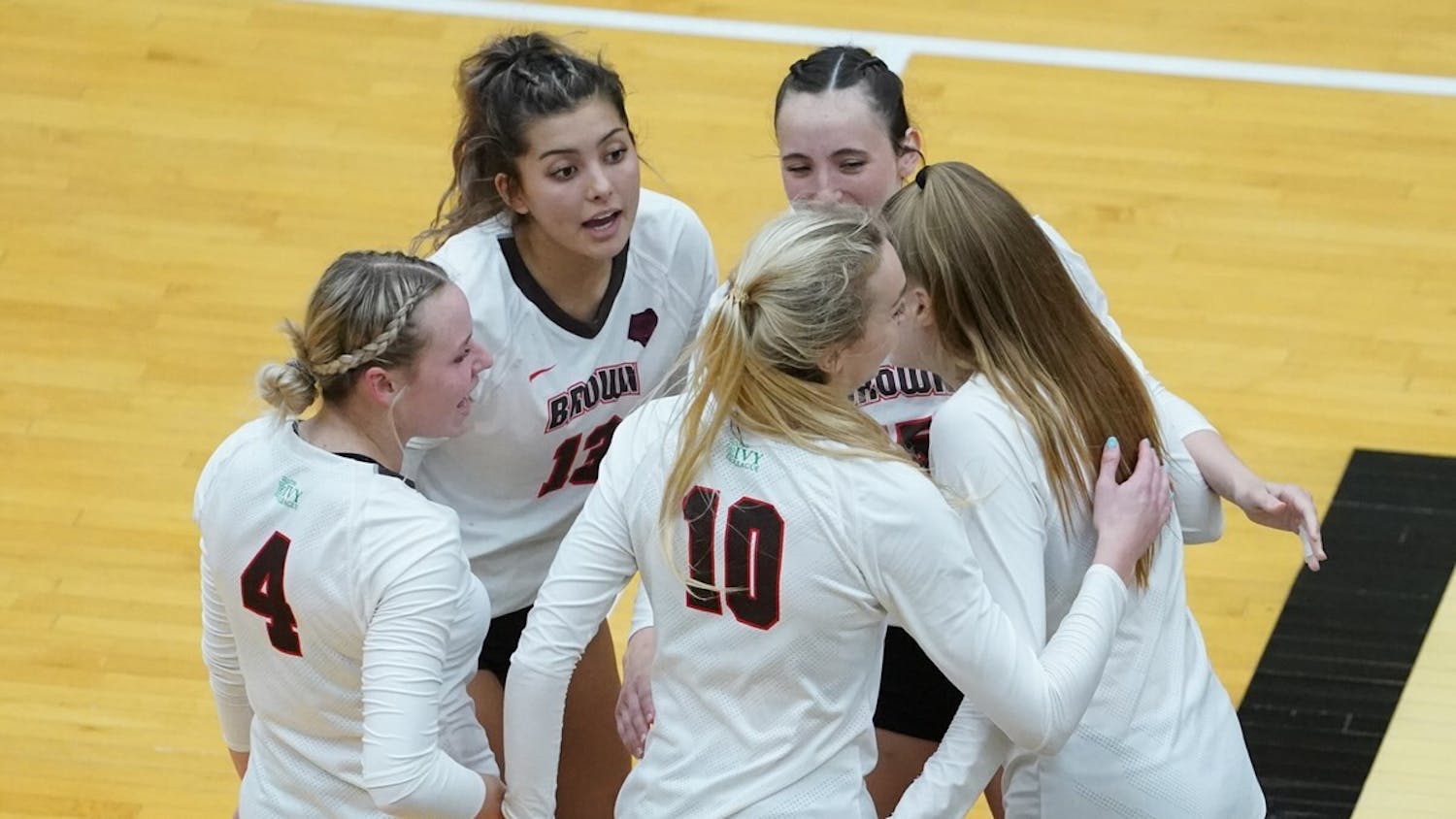Correction appended.
From the stadium lights to the stage lights, the members of Jockapella are team players who demonstrate commitment and passion both on and off the field. Jockapella, approved by the Undergraduate Council of Students as a Category I group last year, is an a cappella group made up of student-athletes.
Three members of the football team — Brad Herzlich '14, Jeffrey Izon '13 and Ade Oyalowo '14, founded Jockapella. Izon had considered joining pre-existing a cappella groups, but balancing the commitment around his football practice schedule was unfeasible, he said. "A cappella is a commitment of its own that wouldn't coincide well with playing a sport," he said.
But the solution to Izon's dilemma took shape during football preseason last fall. Izon and Oyalowo had been childhood friends, and when they met Herzlich at training camp, the three became quick friends and soon forged a musical bond.
"On picture day we were sitting around waiting for our pictures to get taken, and someone started singing ‘A Whole New World' from Aladdin," Herzlich recalled. After this impromptu song, Izon posed his idea for an all-athlete a cappella group to Oyalowo and Herzlich. The group would cater to the demanding schedules of athletes. The trio was determined to showcase their hidden talent in a different arena — the musical stage.
"Everyone was extremely supportive of the idea," Herzlich said. "By the nature of how friends are, people will make jokes, but everyone was very excited and eager to help out." Jockapella had their first big gig at last year's football banquet.
The birth of Jockapella
Jockapella consists of 15 members — seven males and eight females — who hail from different athletic teams. Caroline Saltonstall '13 is the sole non-athlete of the troupe. Five men hail from the football team, making up Jockapella's largest constituency, followed by three track and field members. The group also includes members from the women's ice hockey, field hockey, soccer, swimming and diving, equestrian and gymnastics teams.
The founders call Saltonstall the group's "superfan."
"I sometimes forget that I'm the only non-athlete in Jockapella," Saltonstall wrote in an email to The Herald. She was interested in joining an a cappella group but was hesitant to try out for an established group because of her inability to read music. Jockapella was the perfect option. Since she was already friends with some members of the group, Saltonstall felt less intimidated. "I liked that for a lot of us, a cappella is something that we do because we simply enjoy doing it," she wrote. While she feels comfortable among the group of athletes, an upcoming event will require her to run and sing at the same time.
"That, I'm worried about. Nobody else seems phased by it!" Saltonstall wrote.
A unique musical ensemble
Though Jockapella has staged a number of performances, so far they have been closed performances for private banquets and events. But the group plans on becoming more active in the public a cappella scene. Herzlich said the group has talked with the Jabberwocks — one of Brown's all-male a cappella groups — about joining together for a collaborative effort under the name of "The JabberJocks." In addition, the group plans on singing the National Anthem to open Special Events Committee's Spring Carnival.
Herzlich, Izon and Oyalowo all love the experience of performing, whether it involves a football or a microphone. But some members get more nervous preparing to sing than they do before a big game, Izon said.
Jockapella take input from all their members and incorporate their different tastes. "Personally, I love Disney," Izon said. Jockapella is different from other a cappella groups because they are not as rigid, Saltonstall wrote. "I think that we care more about the individual personalities of the performers as opposed to their ‘talent.'"
Bumps in the road
The group's success did not come without its fair share of challenges. Narrowing down the group was the first road-block. "We saw a lot of talented athletes audition, but we decided to keep our group at a maximum of 15," Oyalowo said. Many of those who auditioned brought different vocal ranges and strengths to the group, so turning people away was difficult. Despite the cuts, some of those who previously did not make the group auditioned again this year and gained a spot.
Auditions were open to everyone — "we review people as not just ‘athletes or non-athletes' but as people with cool and different skills," Oyalowo added. But members of the group are required to appreciate sports even if they do not play for one of the University's official teams, he said.
Another issue was time commitment. The three founders lamented that they have lost a number of members due to busy schedules. Over the past year, the group has had a lot of turnover, whi
ch slowed them down, Herzlich said. "But with the group we have now, things are looking very hopeful," he added.
Finally, Jockapella is struggling in their search for another music director or choreographer. "We've done a lot of work ourselves, but our music theory is a little bit rusty, so we appreciate outside help," Izon said.
Singing through stereotypes
This group of student-athletes has translated the qualities they have developed on the athletic fields — dedication, commitment, teamwork and practice — into a new arena. The founders have been overwhelmed by the support and interest Jockapella has received so far. Herzlich said that since forming the group, he has noticed a greater appreciation for athletes in the community.
"Some people who aren't very close with athletes see them as narrow-minded and associate them with a certain stigma," he said. Like Herzlich, Izon and Oyalowo are "proud to have the opportunity to show people that we have more to offer than athletic ability."
Saltonstall has a new appreciation for Brown athletes after working closely with them in Jockapella. "I've seen how much effort they put into their athletic career, and it's really impressive knowing how busy they are with athletics, that they have time for things like music," she wrote.
An earlier version of this article incorrectly referred to the group as the Jockapellas. In fact, the group is called Jockapella. The Herald regrets the error.





